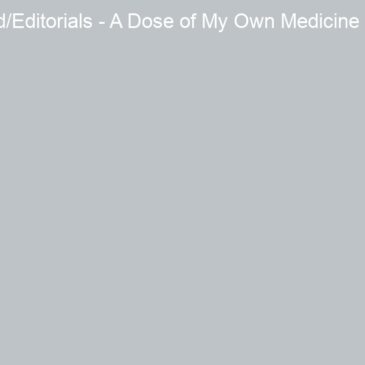The views expressed in the Op-Ed/Editorials page are solely the views of the author(s) and do not necessarily reflect the views of the BASIS, its sponsors, or affiliated organizations.
Nancy Costikyan, MSW, LICSW
BASIS, editorial board member
After I agreed to write something for the Basis, I asked myself, ‘what do I really know about addiction, and about those who have lost control over their lives because of it?’ Not finding a good enough answer, I decided to play to my strengths: ignorance and bewilderment. So I started to write about some of my own unanswered questions about this field. There I was, safely ensconced in the very abstract world of rhetorical questions when something came up. Or, I should say, came down. To be more precise, it was my lung. Collapsed. Several times. So I’m going in for major surgery. And that brings me to drugs.
It’s not just that I am afraid that they won’t give me enough pain medication out of concern that they will turn me into an “addict”. The medical community’s pervasive tendency to withhold appropriate narcotics for pain management is no great secret. I like to think that things are better here in Boston. During my initial hospitalization a few weeks ago, I had endured nearly 24 hours without food—or caffeine—until they could mosey around to putting in a chest tube. I finally asked for some tylenol for my caffeine headache. The nurse replied, “…No, there isn’t an order written for tylenol. But there is one for morphine. Would you like some morphine?” After contemplating the absurdity of the situation for a moment, I accepted her offer.
So it’s not so much that I am afraid that I will resist the medication out of fear of becoming psychologically dependent upon it. I have never found it necessary to test my strength by denying myself necessary pain relief. In fact, following minor surgery many years ago, I kept taking those percosets as prescribed—even though my nose itched maddeningly, my head throbbed and I kept throwing up. My roommate’s boyfriend (a connoisseur of all things pharmaceutical) observed mildly that it wasn’t the surgery that was making me so sick. Instead, he suggested, it was the side effects of the perks. I wondered, ‘who would do this to themselves on a regular basis?’ and then, ‘why didn’t they warn me about this?’ Side effects. No magic bullet. Who knew?
Years later, I was in the hospital following the delivery of my twins. The nurses kept urging me to take the pain killers, and so I did, only to experience ever more unpleasant side effects. ‘Why didn’t I remember this? And why didn’t they remind me?’ I wondered. Then I experienced directly something that I had been hearing about from patients for years—something that made me realize that many medical personnel see two kinds of patients. They see ‘addicts’, to whom they deliver stern lectures about drugs, and ‘non-addicts’, for whom they prescribe drugs without providing much patient education at all. This experience involved my nurse, who was pleasant enough, and concerned about my pain…until something changed.
It happened like this. I have a friend at this same hospital who consults to different units on cases involving addiction. When my friend came to visit me, my nurse recognized her from previous patient consultations. Soon after my friend left, the nurse entered my room, eyeing me warily. She was decidedly less friendly. Her suspicion that I was a person with an addictive disorder was revealed in the questions she asked me about my friend’s presence earlier that morning. Eventually the nurse realized that it had simply been a social visit, and her demeanor changed dramatically. I went from being a probable ‘addict’ to a vulnerable patient once again in her eyes. “Take the pills”, she urged me. I took the pills. I suffered the side effects. I took more pills to counter the side effects. I decided that this was all my husband’s fault.
But in the final analysis, it isn’t even really the side effects of the drugs that I am most afraid of. It’s not that I have trouble believing my surgeon who tells me I will be fine after he tames the unruly lung. He does this sort of procedure all the time, and I need to trust his expertise. And it’s not just that despite all my planning, if my lung falls down on the job again before the scheduled surgery, I will not pass go but will head directly to the OR.
It’s just that suddenly I do know in a non-abstract, non-rhetorical way that there really is only one kind of patient. Neither an addict nor a non-addict. Only a fragile person who is suffering, and vulnerable—and feeling, in the most bewildering of ways, a loss of control. AA would say, “let go.” I’ve said variations on that theme to patients with addictive disorders for years. I’ve urged them to trust their capacity to cope with the pain that life brings them, and to trust in the wisdom of others who are committed to helping them. As I have urged so many patients to do, I am trying to accept that there are things I cannot change. And I’m trying to let go of the illusion of control. I really am.
It’s just that I’m afraid of the side effects.
What do you think? Comments on this article can be addressed to Nancy Costikyan.




